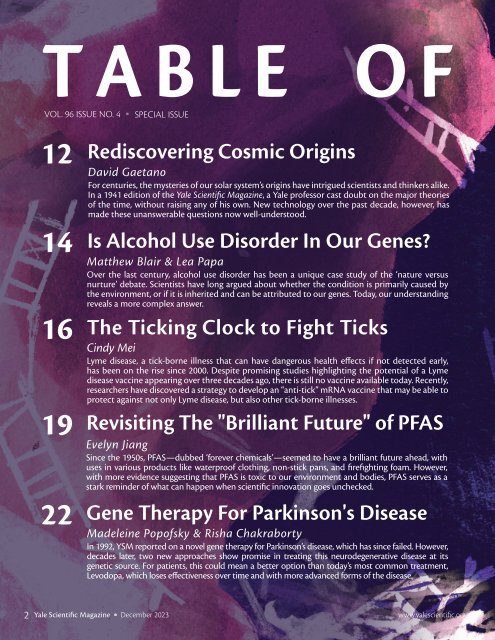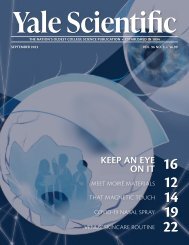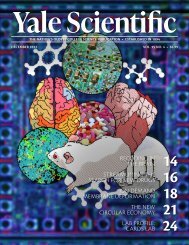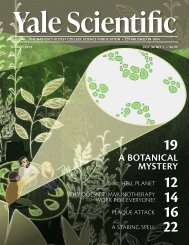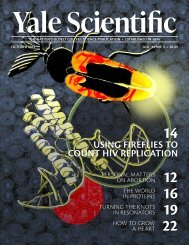YSM Issue 96.4
Create successful ePaper yourself
Turn your PDF publications into a flip-book with our unique Google optimized e-Paper software.
TABLE OF<br />
VOL. 96 ISSUE NO. 4<br />
SPECIAL ISSUE<br />
12<br />
Rediscovering Cosmic Origins<br />
David Gaetano<br />
For centuries, the mysteries of our solar system’s origins have intrigued scientists and thinkers alike.<br />
In a 1941 edition of the Yale Scientific Magazine, a Yale professor cast doubt on the major theories<br />
of the time, without raising any of his own. New technology over the past decade, however, has<br />
made these unanswerable questions now well-understood.<br />
14 Is Alcohol Use Disorder In Our Genes?<br />
Matthew Blair & Lea Papa<br />
Over the last century, alcohol use disorder has been a unique case study of the ‘nature versus<br />
nurture’ debate. Scientists have long argued about whether the condition is primarily caused by<br />
the environment, or if it is inherited and can be attributed to our genes. Today, our understanding<br />
reveals a more complex answer.<br />
16 The Ticking Clock to Fight Ticks<br />
Cindy Mei<br />
Lyme disease, a tick-borne illness that can have dangerous health effects if not detected early,<br />
has been on the rise since 2000. Despite promising studies highlighting the potential of a Lyme<br />
disease vaccine appearing over three decades ago, there is still no vaccine available today. Recently,<br />
researchers have discovered a strategy to develop an “anti-tick” mRNA vaccine that may be able to<br />
protect against not only Lyme disease, but also other tick-borne illnesses.<br />
19 Revisiting The "Brilliant Future" of PFAS<br />
Evelyn Jiang<br />
Since the 1950s, PFAS—dubbed ‘forever chemicals’—seemed to have a brilliant future ahead, with<br />
uses in various products like waterproof clothing, non-stick pans, and firefighting foam. However,<br />
with more evidence suggesting that PFAS is toxic to our environment and bodies, PFAS serves as a<br />
stark reminder of what can happen when scientific innovation goes unchecked.<br />
22 Gene Therapy For Parkinson's Disease<br />
Madeleine Popofsky & Risha Chakraborty<br />
In 1992, <strong>YSM</strong> reported on a novel gene therapy for Parkinson’s disease, which has since failed. However,<br />
decades later, two new approaches show promise in treating this neurodegenerative disease at its<br />
genetic source. For patients, this could mean a better option than today’s most common treatment,<br />
Levodopa, which loses effectiveness over time and with more advanced forms of the disease.<br />
2 Yale Scientific Magazine December 2023 www.yalescientific.org


